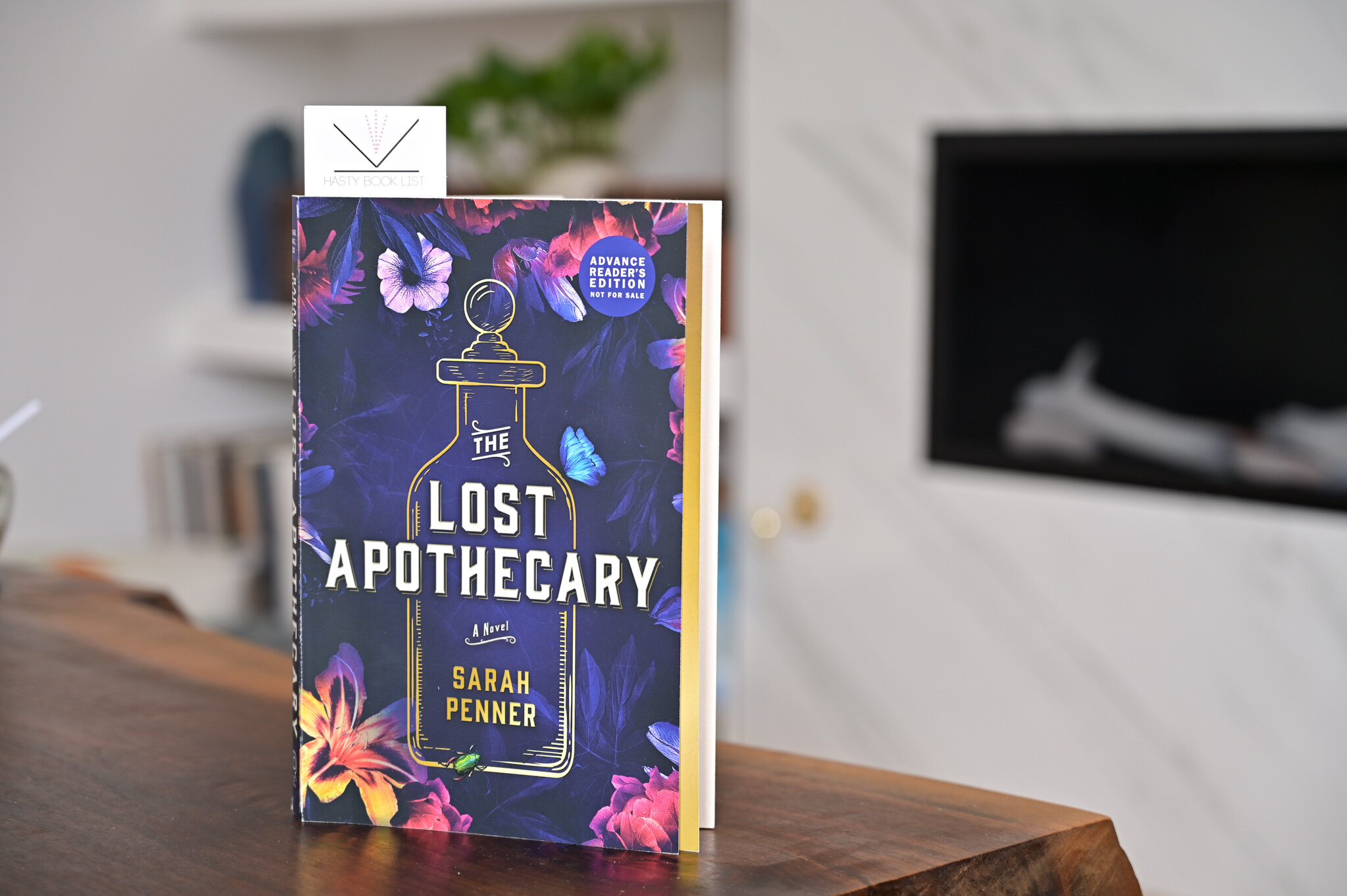The Lost Apothecary
Book Review - The Lost Apothecary by Sarah Penner
HBL Note: Every once in awhile (a rare enough occurrence that I’m still fascinated by it) a debut novelist captures the attention of the right people at the right time for their first book to cause quite the stir in the publishing industry. Sarah Penner’s book, The Lost Apothecary, has already sold in 12 countries and the publisher expects it to be, “one of the biggest of the Winter season.”
Book Review - The Lost Apothecary by Sarah Penner
So obviously I had to read it. The Lost Apothecary is about a woman who travels to London as a way to distance herself from her cheating husband. She goes on a mudlarking adventure (more on this later…fascinating stuff!) and finds an old apothecary vial which sparks her to research its origins. The dual timeline book jumps between this present day story and the story of the Apothecary in the late 1700s. It is told from three perspectives: the present day woman, Caroline Parcewell; the secret apothecary, Nella; and a young, twelve year old girl, Eliza.
I really enjoyed this book, but what captivated me the most was learning about mudlarking. In the acknowledgments section, Sarah Penner gives a shout out to “Florrie” Evans who she met while “mudlarking on the River Thames in the summer of 2019.” I looked her up on Instagram, per Sarah’s suggestion, and found myself falling down the rabbit hole of fascinating historic finds in the mud of the River Thames. I’m including a post from her Instagram account (@flo_finds) here so you can get lost in her beautiful photographs, too.
Book Review - The Lost Apothecary by Sarah Penner
Books Like The Lost Apothecary
If you enjoyed "The Lost Apothecary" by Sarah Penner, you might appreciate the following books that feature elements of historical fiction, mystery, and strong female protagonists:
"The Night Circus" by Erin Morgenstern
A magical, atmospheric novel about a mysterious circus that only appears at night and the competition between two young illusionists.
"The Giver of Stars" by Jojo Moyes
Based on a true story, this book follows a group of women in Depression-era America who deliver books as part of Eleanor Roosevelt’s traveling library.
"The Paris Library" by Janet Skeslien Charles
Set in Paris during World War II and Montana in 1983, this novel tells the story of the librarians who joined the resistance during the Nazi occupation.
"The Ten Thousand Doors of January" by Alix E. Harrow
A young woman discovers a book that opens doors to different realities, leading her on a quest filled with magic and adventure.
"The Book of Lost Friends" by Lisa Wingate
Alternating between Reconstruction-era Louisiana and a modern-day teacher, this story explores the history of families separated by slavery and their descendants.
"The Secrets We Kept" by Lara Prescott
A tale of secretaries turned spies during the Cold War, inspired by the true story of the CIA plot to smuggle the banned book "Doctor Zhivago" into the USSR.
"The Miniaturist" by Jessie Burton
Set in 17th century Amsterdam, this novel follows a young bride who receives a miniature replica of her home, which starts to predict unsettling events.
"The Book Thief" by Markus Zusak
Narrated by Death, this novel is set in Nazi Germany and tells the story of a young girl who finds solace in stealing and sharing books.
"The Alice Network" by Kate Quinn
A dual timeline story about a female spy network in World War I and a young American searching for her cousin in post-World War II France. This book also appeared on a list of Best Books by Kate Quinn.
"The Shadow of the Wind" by Carlos Ruiz Zafón
In post-World War II Barcelona, a boy discovers a mysterious book that leads him into a labyrinth of secrets and dangers. Click here to find my book review of The Shadow of the Wind.
“The Amalfi Curse” by Sarah Penner
Sarah Penner, the New York Times bestselling author of "The Lost Apothecary" and "The London Seance Society," has a new book titled "The Amalfi Curse." This novel follows a nautical archaeologist searching for sunken treasure in Positano, who discovers a centuries-old curse, powerful witchcraft, and a tale of perilous love on the high seas. The book, likened to "The Cloisters" and "The Familiar," was sold in a major seven-figure, two-book deal to Erika Imranyi at Park Books. It is set for publication in May 2025 and was brokered by Stephanie Liberman at Janklow and Nesbit.
These books combine rich historical settings with intriguing plots and compelling characters, similar to "The Lost Apothecary."
“If I weren’t an author, I’d be an “Archivist at the British Library, working with rare books and manuscripts.””
About Author Sarah Penner
Sarah Penner is an American author known for her historical fiction novels. Her debut novel, The Lost Apothecary (2021), received widespread acclaim and became a New York Times bestseller. Penner's writing is characterized by its immersive storytelling, meticulous historical detail, and strong, multidimensional female characters.
Writing Style
Historical Detail: Penner excels in weaving rich historical contexts into her narratives. She meticulously researches the periods she writes about, which allows her to create vivid and authentic settings. Her attention to detail brings past eras to life, engaging readers who appreciate historical accuracy.
Dual Timelines: One of Penner's signature techniques is the use of dual timelines. In The Lost Apothecary, she intertwines the stories of women from the 18th century and the present day, exploring how their lives intersect across time. This structure adds depth and complexity to her plots, maintaining suspense and intrigue.
Strong Female Protagonists: Penner's books feature compelling female leads who navigate challenging circumstances. These characters often exhibit resilience, intelligence, and a sense of agency, which resonate with readers seeking empowering stories.
Mystery and Suspense: Penner incorporates elements of mystery and suspense, often involving secrets from the past that impact the present. This keeps readers engaged as they piece together clues and anticipate twists.
Reader Appeal
Engaging Plotlines: Readers appreciate Penner's ability to craft captivating stories that keep them hooked from beginning to end. Her plots are well-constructed, with a balance of intrigue, emotion, and resolution.
Relatable Themes: Themes of empowerment, identity, and the bonds between women are central to Penner's work. These themes are universally relatable and add emotional depth to her stories, making them resonate with a wide audience.
Atmospheric Settings: Penner's descriptive writing transports readers to different times and places, whether it's the dark, secretive streets of eighteenth century London or the modern-day challenges of her characters. This atmospheric quality adds to the immersive experience.
Character Development: The depth and development of her characters are often highlighted as a strength. Readers feel connected to her protagonists, rooting for them as they face and overcome obstacles.
Notable Works
The Lost Apothecary: This novel centers on an apothecary shop in 18th century London that secretly dispenses poisons to women seeking liberation from the men who have wronged them. The story alternates between the past and present, where a modern-day woman discovers clues to the apothecary's legacy.
The London Séance Society: In this upcoming novel, Penner explores themes of spiritualism and mystery, delving into the world of séances and the supernatural. Though less is known about this work, it is highly anticipated by fans of her first book.
Overall, Sarah Penner's novels are praised for their rich historical settings, strong female characters, and the seamless blending of mystery and historical fiction. Her engaging writing style and the relatability of her themes have garnered her a dedicated readership.
About The Lost Apothecary (from the publisher):
A stunning exploration of the power of women’s relationships with one another and of women rebelling against the society that limits them, THE LOST APOTHECARY follows three women who change each other’s lives across the barrier of time. Nella is an apothecary who keeps a hidden shop at the back of a dark alleyway in 18th century London. There, she dispenses poisons to liberate women from the oppressive men in their lives. She has two rules: the poison must never be used to harm another woman and the names of the murderer and her victim must be recorded in her register. When 12-year-old Eliza arrives at her shop seeking poison on behalf of her mistress, an unexpected friendship develops setting in motion a series of events that jeopardizes Nella’s world.
In the present-day London, Caroline, an aspiring historian, spends her tenth wedding anniversary in London alone, reeling from the recent discovery of her husband’s infidelity. As she reevaluates her life and what she wants she finds a small vial while mudlarking in the River Thames. Intrigued, she throws herself into researching the vile and suspects she’s found the culprit in the never-solved “apothecary murders” that haunted London two hundred years earlier. As she deepens her search, Caroline’s life collides with Nella’s and Eliza’s in a stunning twist of fate.
Penner was initially inspired to write THE LOST APOTHECARY while looking through a book of mudlarking finds in 2016. “Mudlarking is a pastime for many Londoners, having been around for centuries, but recently experienced a resurgence in popularity,” explains Penner. She imagined a story of a woman finding a mysterious vial and tracing its sinister history. Enthralled by the scandal of 18th century London, a time when reliable poison detection methods did not yet exist, and when women had few options for power and influence and were lost to history simply because they did not have an equal say in society, she chose to set the book then. “My book is on way to explore that reality and remediate, even if only in a fictional way,” she writes.
Book Review - The Lost Apothecary by Sarah Penner







